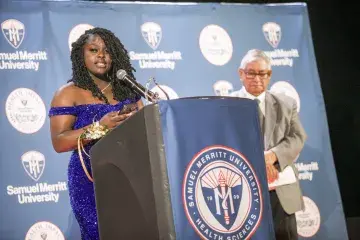Social Scientist Says Even Middle-Class Black Women Face Poor Health Outcomes

Like many black women, Tina Sacks says her mother was repeatedly rebuffed when she sought help from doctors after detecting a lump in her breast. It wasn’t until a mammogram technician urged her to push harder for a diagnosis that she learned she had breast cancer.
Her mother’s experience had a lasting effect on Sacks and was the original inspiration for her new book, Invisible Visits: Black Middle-Class Women in the American Healthcare System.
Sacks discussed her research for the book during a Black History Month celebration at Samuel Merritt University (SMU) on Feb. 26, an event that included powerful musical performances by Oakland’s Allen Temple Unity Choir, whose members wore colorful African attire.
The book demonstrates the persistence of racial and gender discrimination when black women seek medical treatment, even among those who are educated, insured, and financially secure. Sacks conducted focus groups and in-depth interviews to tell troubling stories of the challenges faced by black women when they confronted the predominately white U.S. health care system.
“I definitely see myself as a person who is trying to bear witness for other black women,” said Sacks, an assistant professor at UC Berkeley's School of Social Welfare who worked at the federal Centers for Disease Control and Prevention before seeking a doctorate in social welfare.
Health inequities exist across class, according to Sacks, with higher-income black women experiencing equal or higher rates of infant mortality and hypertension than white women living in poverty.
“Black people are not getting the standard of care they should receive,” she said.
Specifically, Sacks said, black women are at higher risk of dying in childbirth or during the subsequent year as compared to white women. She pointed to tennis star Serena Williams, who almost died after her daughter was born last year when she suffered from a pulmonary embolism and other complications following an emergency C-section. Williams’ concerns and request for a CT scan and blood thinner were initially ignored, according to Sacks, and treatment was delayed.
“She is a larger-than-life icon, but she is still just a black woman,” said Sacks.
She said efforts being made at SMU and elsewhere to diversify the health care workforce will help to ease the inequities that cause black people in the United States to live sicker and die younger, but we shouldn’t stop there.
“I really think that we have to have a reckoning for what we are, who we are as a society,” said Sacks. “The foundation of this country is a white supremacist patriarchy. It is built certainly on stolen land and enslaved bodies … without an acknowledgment of that, I think it’s hard to go forward.”
Watch a video SMU Black History Month celebration.


